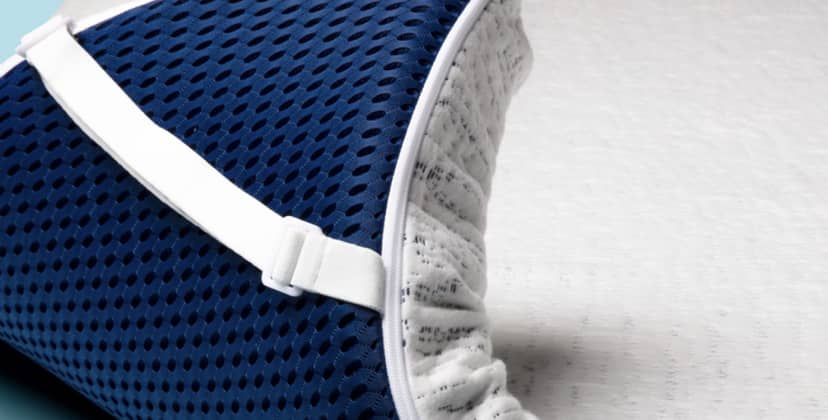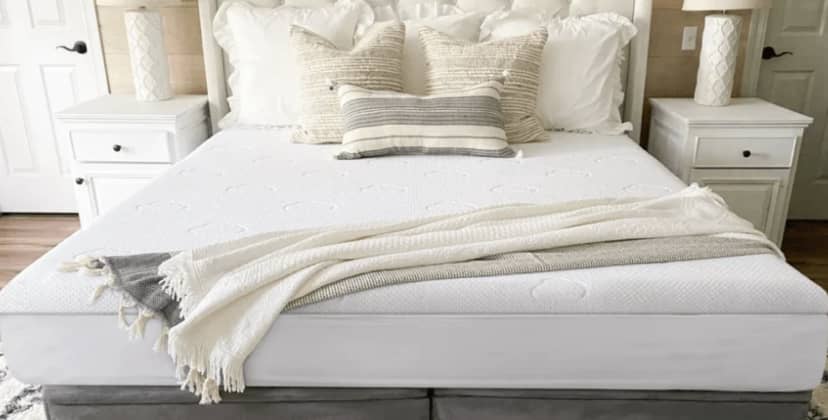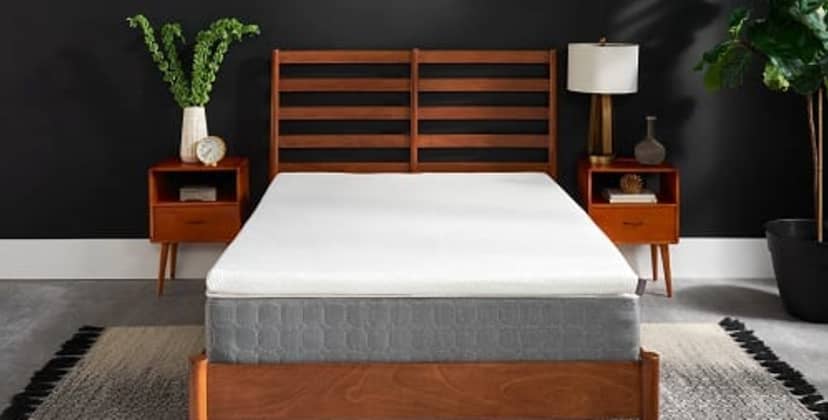When you buy through our links, we may earn a commission. Products or services may be offered by an affiliated entity. Learn more.
Best Mattress Toppers of 2024
Our List of the Top Expert-Tested Picks
Mattress toppers make a mattress feel softer or firmer, and can also protect the mattress surface from wear and tear. Our team has tested a wide range of toppers with varying firmness levels, materials, and profiles. We evaluated factors like overall quality, pressure relief, motion isolation, and temperature neutrality. To ensure our picks represent the experiences of many sleepers, our team is made up of testers with different body types and sleep positions.
While a topper can temporarily make your sleep surface feel comfortable, it should be considered a temporary fix — not a permanent solution — for an old, sagging mattress. If you’re looking to replace your bed, check out our best mattress list.
Our Verdict – What’s the Best Mattress Topper of the Year?
We often recommend mattress toppers for those who want to alter the feel of their sleep surface, especially if their mattress has signs of heavy wear. The Saatva Graphite Mattress Topper’s thick profile should feel comfortable on most mattresses, including older models with indentations.
Top Picks Overview
-
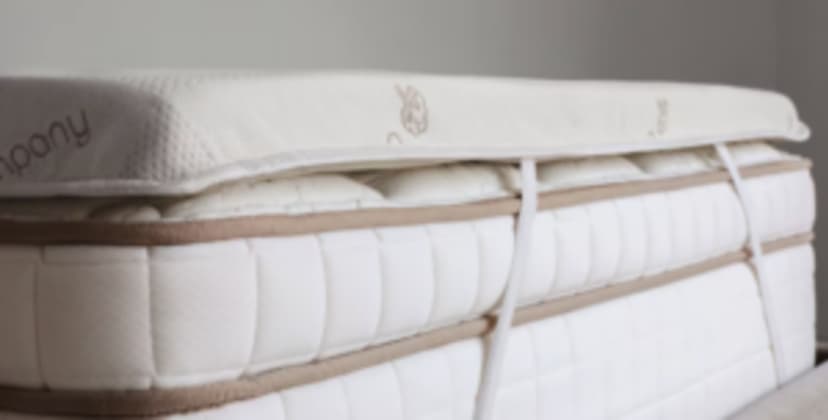
Best Overall
Saatva Graphite Memory Foam Mattress Topper
Shop Now
-
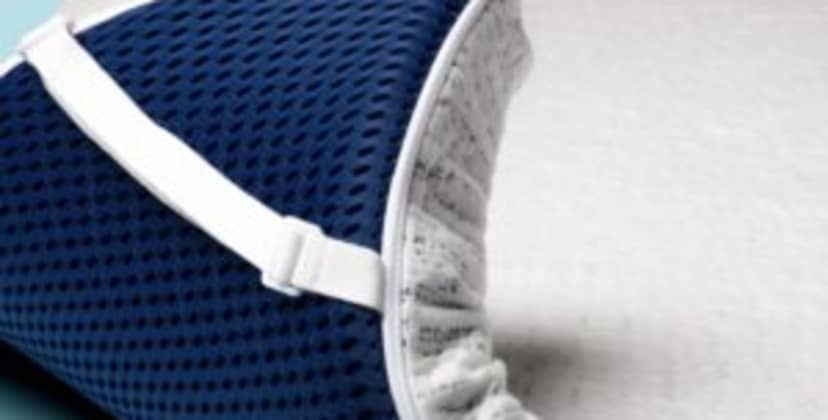
Best Value
ViscoSoft Select High Density Mattress Topper
Shop Now
-
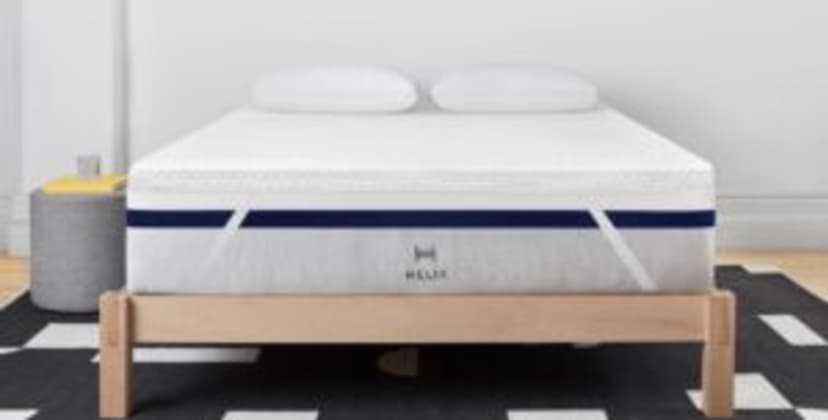
Most Comfortable
Helix GlacioTex Premium Mattress Topper – Luxury Plush
Shop Now
-
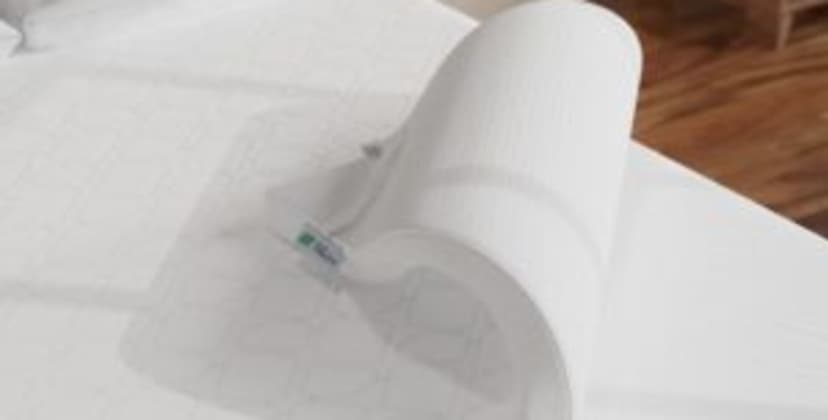
Best Cooling
Sleep Is the Foundation Cooling Memory Foam Mattress Topper
Shop Now
-
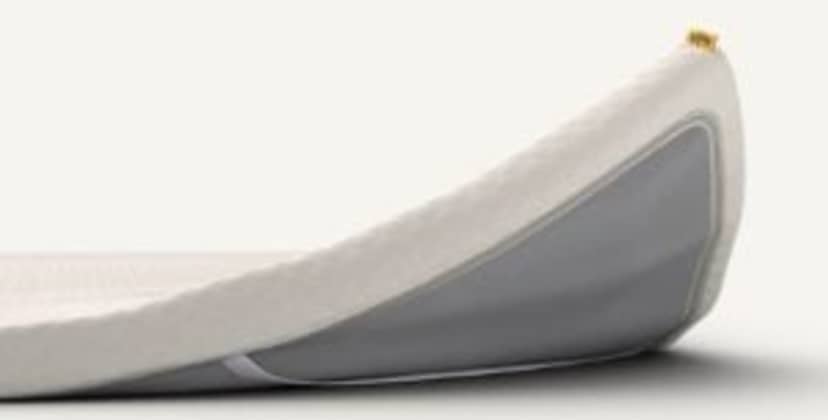
Best for Side Sleepers
Nolah Mattress Topper
Shop Now
-
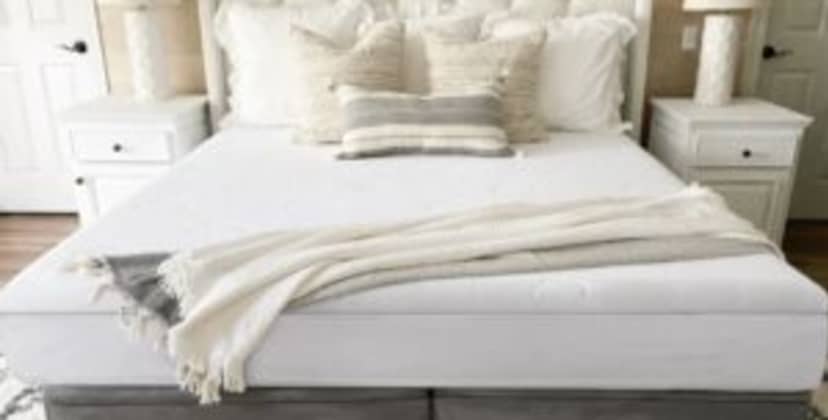
Best Pressure Relief
Puffy Deluxe Mattress Topper
Shop Now
-
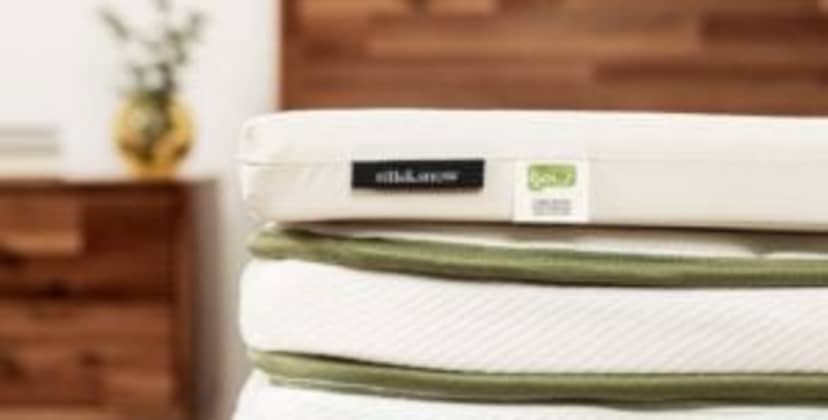
Best for Back Pain
Silk & Snow Organic Mattress Topper
Shop Now
-
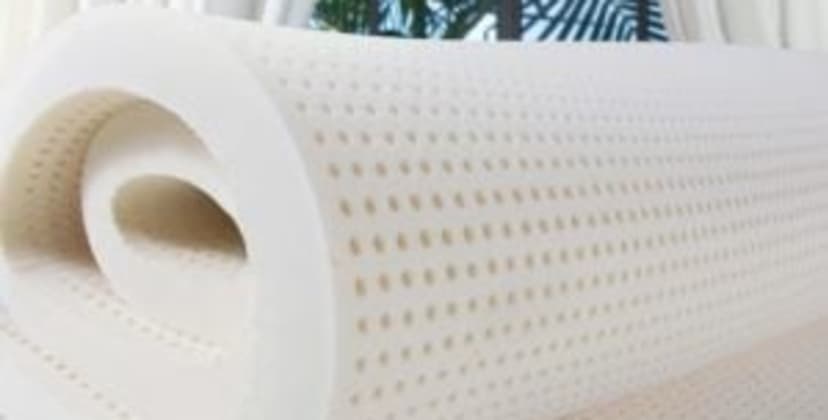
Best for Spinal Alignment
PlushBeds Natural Latex Topper
Shop Now
-
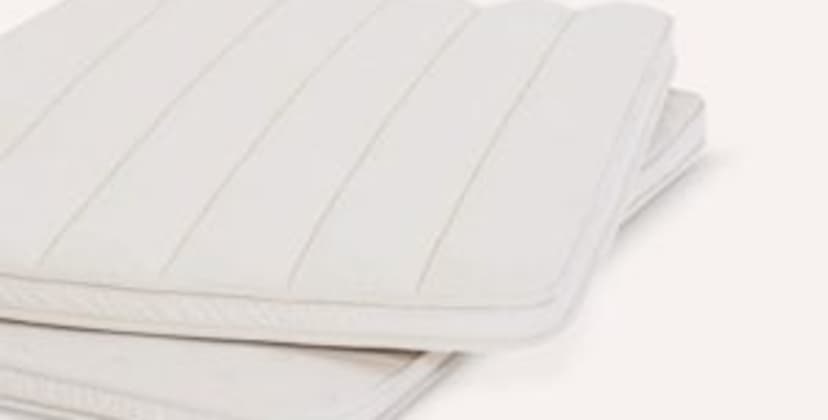
Best Luxury
Birch Organic Mattress Topper
Shop Now
-
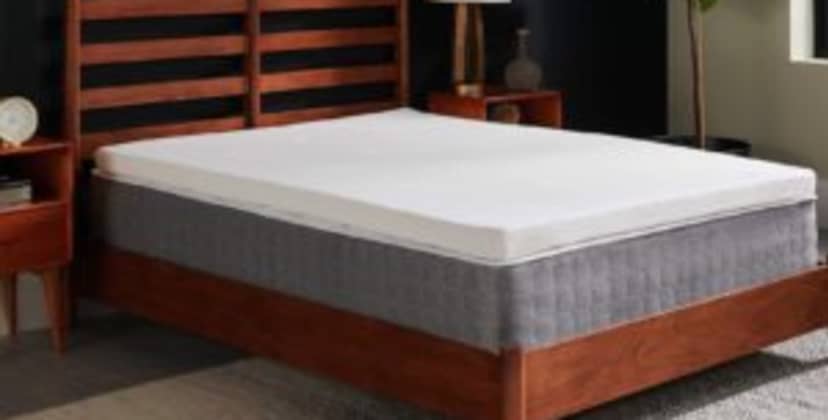
Best for Hip Pain
Tempur-Pedic TEMPUR-Adapt Topper
Shop Now
-
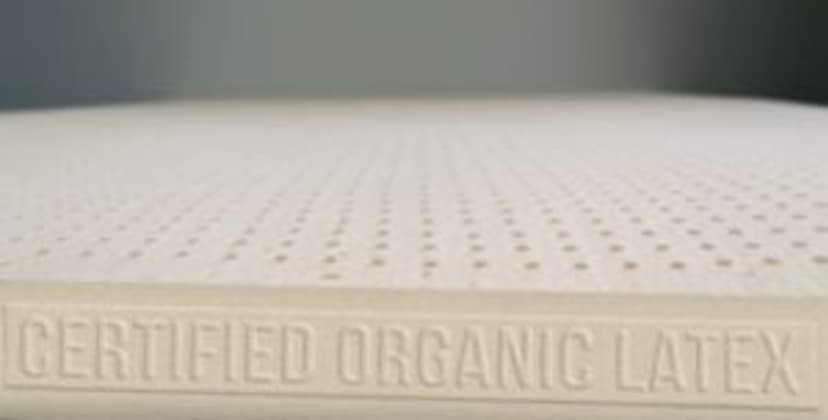
Best Firmness Options
Turmerry Latex Mattress Topper
Shop Now
In-Depth Reviews
Best Overall
Saatva Graphite Memory Foam Mattress Topper
Use this link for the most current Saatva discounts
Shop Now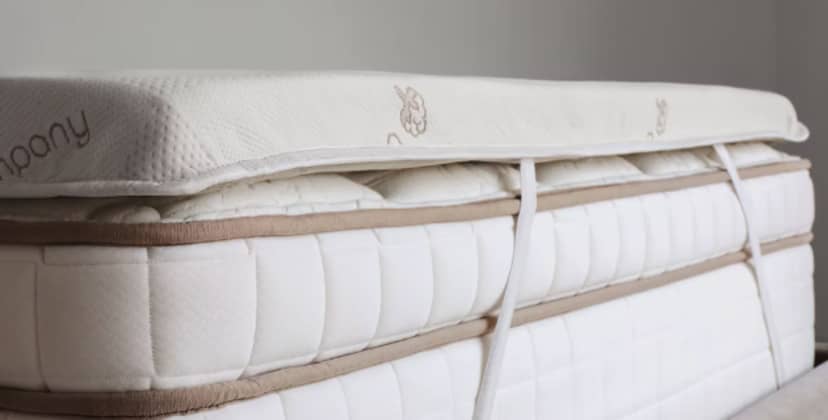
“We recommend the Saatva Graphite Mattress Topper for sleepers who enjoy the feel of foam toppers but don’t enjoy the heat retention that often happens with foam. This topper runs cooler than many of the other foam toppers we’ve tested.” – Tom Ryan, Head of Product Testing
-
Pros
-
Foam design excels at pressure relief
-
GOTS-certified organic cotton cover
-
180-night sleep trial and 1-year warranty
-
-
Cons
-
Thick profile and soft design may cause sinkage for people over 230 pounds
-
Above-average pricing for a foam topper
-
Price
$445
Material
1″ Graphite-infused memory foam, 2″ Memory foam
Firmness
Medium Soft (4)
Saatva offers a lineup of mattress toppers, each with unique strengths. Our tests show that the Graphite Mattress Topper excels at pressure relief thanks to the close contouring, making this an ideal topper for sleepers who experience pressure buildup or simply enjoy the “hugging” feel of foam.
How It Performed
The Graphite topper was rated medium soft (4) by our testers, but it didn’t sink too much for sleepers who weigh up to 230 pounds. With a 3-inch profile, the topper offers substantial plushness for mattress surfaces that are overly firm or worn. The topper absorbs most motion, which may be helpful for co-sleepers who frequently wake each other up with movement at night. An infusion of graphite helps offset some of the foam’s heat-absorbing properties, so the topper performed well in our temperature neutrality tests.
What It’s Made of
The topper is composed of adaptive memory foam that conforms to your body. It’s encased in a cover made of breathable, sustainably sourced organic cotton certified by the Global Organic Textile Standard. Elastic corner straps keep the topper in place to minimize shifting, which often occurs if you move around a lot while you sleep.
Shipping is free for all contiguous U.S. orders, and every purchase is backed by a 180-night sleep trial and 1-year warranty.
“The ViscoSoft Select High Density Mattress Topper strikes the right balance between close contouring and even support. It’s plush enough to cushion sensitive pressure points, but we don’t expect uncomfortable sinkage to be an issue for most people.” – Tom Ryan, Head of Product Testing
-
Pros
-
Memory foam closely contours to relieve pressure
-
Removable, machine-washable cover
-
Optional infused versions with calming lavender or cooling activated charcoal
-
-
Cons
-
Potential for off-gassing odor after unpackaging
-
Back and stomach sleepers over 230 pounds may prefer a firmer topper
-
Price
$200
Material
Gel-Infused memory foam
Firmness
Medium Firm (6)
The ViscoSoft Select High Density Mattress Topper has a medium feel that closely cradles your body in all the right spots but still feels fairly supportive, especially for a foam topper. If you’re looking to improve your bed’s pressure relief, this is a solid choice.
How It Performed
During tests, we found the topper was optimal for many side sleepers because it offered ample padding for the shoulders and hips. By cushioning these areas while supporting the rest of the body, this helped ensure healthy spinal alignment – a common issue for side sleepers. Back sleepers weighing up to 230 pounds also felt comfortable on this topper. The foam supported the torso and midsection without sagging, and it cradled the head, neck, and legs.
The topper is a good option for couples, as well. Our motion isolation tests showed that the foam absorbs most movement to greatly reduce motion transfer, and the topper itself is completely silent. This can minimize sleep disruptions for people who tend to wake up when their sleep partner changes positions or gets in and out of bed.
What It’s Made of
The Select High Density Topper is constructed from memory foam. This material conforms closely to equally distribute your weight, support the spine, and alleviate pressure points throughout the body. Due to its medium feel, this topper was best suited to testers weighing up to 230 pounds who prefer to sink somewhat deeply into their mattress. The topper also sleeps fairly cool compared to other memory foam models. This is due in part to a breathable cover made of rayon derived from bamboo, as well as cooling gel infused into the foam to help regulate surface temperatures.
In addition to the standard model, ViscoSoft offers two other versions of the topper with special components. One of these toppers is infused with lavender for a calming scent intended to help you relax before falling asleep. The other contains active charcoal for extra cooling.
The Select High Density Topper is a bargain for shoppers. This model costs much less than other foam toppers we’ve tested, but it conforms evenly and alleviates pressure as well as – if not better than – many more expensive options. The topper comes with a 90-night sleep trial and 5-year warranty. Shipping is free to the contiguous U.S.
Most Comfortable
Helix GlacioTex Premium Mattress Topper – Luxury Plush
Use this link for the most current Helix discounts
Shop Now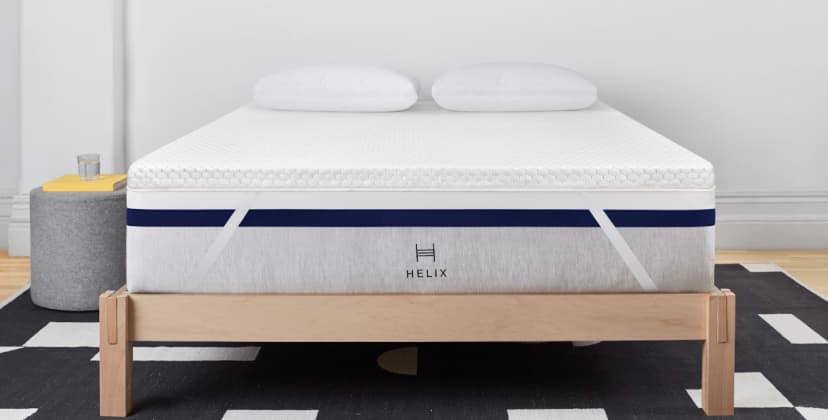
“Helix’s GlacioTex Premium Mattress Topper – Luxury Plush is remarkably soft and adaptive, but the cooling cover mitigates the heat retention issue that often occurs with thick foam layers. The result is a topper that contours closely to reduce pressure and isolate motion while maintaining a comfortable temperature for sleep.” – Jackson Lindeke, Executive Director
-
Pros
-
Plush foam and microcoil layers ensure deep cushioning and contouring
-
Cooling GlacioTex cover dissipates heat from your sleep surface
-
High-profile design greatly improves the comfort level of any mattress
-
-
Cons
-
Strong off-gassing odor for up to 72 hours after unboxing
-
Cover cannot be removed for cleaning
-
Price
$399
Material
1.5″ polyfoam, .75″ microcoils, 1.5″ high-density polyfoam
Firmness
Medium Soft (4)
If your mattress is on its last leg but you aren’t ready to replace it, you should consider a thick topper for the indentations and impressions that make your sleep surface feel uneven. The Helix GlacioTex Premium Mattress Topper – Luxury Plush definitely meets these criteria. With a profile of nearly 4 inches, the topper contains foam and microcoil layers that create a cushy buffer between your body and the mattress. A GlacioTex phase change cover engineered to feel cool at all times also boosts the topper’s temperature-regulating abilities, so you shouldn’t overheat.
How It Performed
The topper is medium soft (4), so while you’ll notice some contouring, excessive sinkage shouldn’t be a major issue. Our tests show the topper is best suited to side sleepers weighing at least 130 pounds and back sleepers up to 230 pounds, but ratings were pretty solid across the board. Only our stomach sleepers over 230 pounds noticed sinkage that could be described as excessive. The topper is also available in a medium firm (6) design if you need more support.
Temperature control is a defining strength of the topper. This can be attributed to the cooling cover, which effectively offsets heat retention from the foam layers, and steady airflow throughout the microcoils. If you share your bed with a partner, the topper should also isolate movement and cut down on disruptive motion transfer. Expect some strong off-gassing for the first few nights after the topper arrives.
What It’s Made of
The topmost layer is composed of adaptive polyfoam, which conforms to your figure without the close “hug” of memory foam. Microcoils provide additional cushioning, as well as some bounce, and dense base foam stabilizes the topper to reinforce the firm feel. A cover made of cooling GlacioTex fabric encases the internal layers. The cover is non-removable, so spot cleaning is needed if stains or smudges occur. Straps at each corner secure the topper to your mattress.
The GlacioTex Premium Mattress Topper – Luxury Plush carries an expensive sticker price reflective of its sophisticated design. While this may be a dealbreaker for budget-conscious shoppers, Helix softens the blow with free shipping to all 50 states and a 100-night trial period. If you decide to keep the topper, you’ll also receive a one-year warranty.
Best Cooling
Sleep Is the Foundation Cooling Memory Foam Mattress Topper
Use this link for the most current Sleep Is the Foundation discounts
Shop Now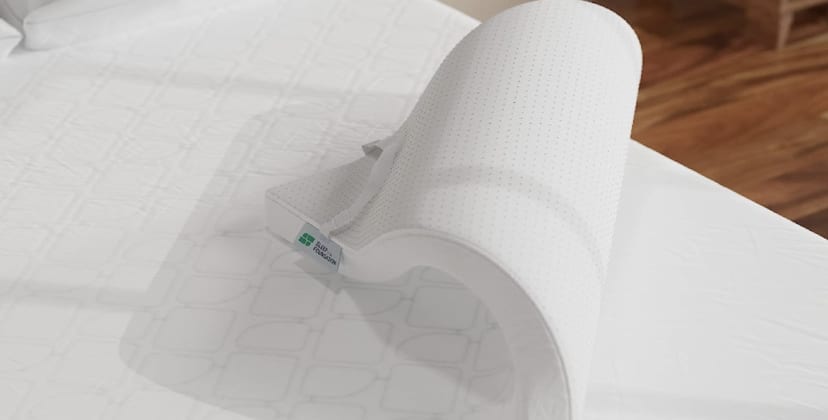
“The Sleep Is the Foundation Cooling Memory Foam Mattress Topper delivers some of our favorite things about memory foam toppers — even contouring, cloud-like cushioning, and excellent motion isolation. Thick corner straps ensure good stability, and the cover is breathable enough to offset some of the foam’s heat absorption.” – Lauren Fountain, Senior Product Editor
-
Pros
-
Solid memory foam conforms closely to promote even alignment and reduce pressure
-
Two-inch profile ideal for mattresses with light to moderate wear
-
Thick, adjustable corner straps secure the topper and prevent shifting
-
-
Cons
-
Foam may emit strong off-gassing odor when the topper is new
-
Not available in twin XL and California king sizes
-
Price
$175
Material
Perforated memory foam (gel-infused)
Firmness
Medium (5)
A memory foam topper can be a great investment if your sleep surface has become rigid with use and now lacks the contouring you need to sleep comfortably. The Sleep Is the Foundation Cooling Memory Foam Mattress Topper contains solid memory foam and offers a medium (5) feel. A 2-inch profile ensures ample cushioning without too much sink, making the topper best suited to mattresses with slight wear and tear.
How It Performed
A mid-range feel paired with a medium profile makes this topper appealing to a wide range of sleeper types, as evidenced during our hands-on testing. Side sleepers across all weight groups, back sleepers up to 230 pounds, and stomach sleepers under 130 pounds all awarded the topper favorable ratings.
As is the case with many foam toppers we’ve tested, this model performed well in the pressure relief and motion isolation testing areas. Strong temperature control was another highlight. While many memory foam toppers absorb heat to an uncomfortable degree, this one sleeps cooler by comparison thanks to its ventilated, gel-infused core and breathable cotton cover.
What It’s Made of
The topper contains 2 inches of memory foam. This material conforms closely to the body, but shouldn’t trap too much heat due to small perforations intended to promote airflow and an infusion of cooling gel that dissipates body heat. A cotton cover encases the foam. You may remove and machine-wash the cover as needed. Each corner is equipped with an adjustable strap for securing the topper to your sleep surface, which prevents it from shifting when you change sleep positions during the night.
The Sleep Is the Foundation Cooling Memory Foam Topper is available at SleepDoctor.com. Shipping is free to addresses in the contiguous U.S. and unopened toppers may be returned within 60 nights for a full refund. If you wish to return a used topper, you may do so within 60 nights for store credit.
Best for Side Sleepers
Nolah Mattress Topper
Use this link for the most current Nolah discounts
Shop Now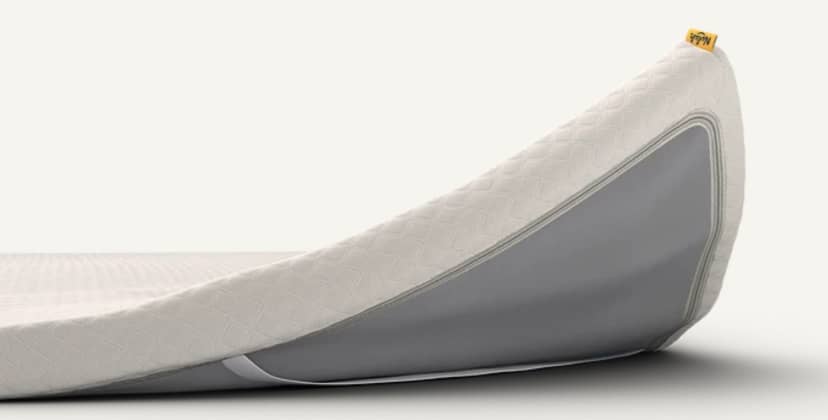
“The Nolah Mattress Topper is an optimal choice if you need a foam layer to cushion an overly firm mattress. Unlike some foam toppers that trap excessive amounts of heat, this topper has copper infusions and a breathable cotton cover to keep overheating at bay.” – Danny Noyed, Senior Product Editor
-
Pros
-
Available in two firmness options
-
Specialized foam excels at cushioning and pressure relief
-
Breathable cotton cover wicks moisture and promotes cooling
-
-
Cons
-
Foam layers may emit strong off-gassing odor for a few days after unboxing
-
Elastic straps limit the topper to mattresses between 10 and 15 inches thick
-
Price
$399
Material
2″ AirFoam polyfoam
Firmness
Medium Soft (4), Medium Firm (6)
The Nolah Mattress Topper is composed of a specialized foam that conforms closely to your body while retaining less heat than conventional memory foam. This cradling helps relieve pressure off sensitive joints and should appeal to anyone who enjoys the deep hug of foam.
How It Performed
The topper performed well with side and back sleepers, since these sleep positions exert pressure on the hips, shoulders, and spine and typically benefit from strong cushioning. You can choose between two firmness levels — plush or luxury firm. We found the plush model had a medium soft (4) feel that appealed to side and back sleepers under 130 pounds. The luxury firm model had a medium firm (6) feel that was most comfortable to back sleepers and some side sleepers, depending on firmness preference.
Foam is known for trapping heat, but the Nolah Mattress Topper is engineered to trap less heat than your typical foam topper. The cover is also made of cotton, which has naturally breathable properties. If you’re a hot sleeper who loves the feel of foam, this topper checks off a lot of boxes.
What It’s Made of
The topper measures 2 inches thick and is composed of Nolah’s specialized AirFoam. This foam has the signature contouring feel of memory foam but is designed to run cooler. The cover is made of organic cotton that wicks moisture and helps ventilate the topper. You can attach the topper to your mattress using elastic straps on each corner. The topper is available in six standard sizes.
Nolah ships the topper for free within the contiguous U.S. You’ll receive a 30-night sleep trial with your topper and a 10-year warranty.
“The Puffy Deluxe Mattress Topper comes in two firmness options, both offering excellent pressure relief due to the all-foam construction. I recommend this for anyone who needs stronger contouring on their bed surface.” – Tom Ryan, Head of Product Testing
-
Pros
-
All-foam construction offers strong contouring
-
Two firmness options
-
Cover is removable and machine-washable
-
-
Cons
-
Those seeking mid-range firmness may not find either design comfortable
-
Foam may absorb and trap heat
-
Price
$229
Material
2.5″ memory foam
Firmness
Soft (3), Firm (7)
The Puffy Deluxe Mattress Topper is available in two firmness levels — soft (3) and firm (7). Each option has a different feel, but both excel at cushioning your body to help relieve any pressure buildup you may experience during sleep.
How It Performed
Most of our testers noticed moderate contouring when lying on the firm model, while the softer version conformed more closely to the body. Ratings for the firm option were especially favorable from our stomach sleepers, who often complain of lackluster support from all-foam toppers. Side and back sleepers weighing more than 230 pounds also felt comfortable. The softer model earned highest marks from side sleepers up to 230 pounds and back sleepers between 130 and 230 pounds.
Pressure relief was a strong performance area regardless of firmness level. If you tend to wake up with sore shoulders and hips, the Deluxe Mattress Topper can help alleviate some of that discomfort. Couples will appreciate the strong motion isolation, especially if you’re easily awoken by a partner’s movements in bed. The virtually noiseless construction is another bonus.
What It’s Made of
The Puffy Deluxe Mattress Topper is composed entirely of memory foam, while the cover is made with a polyester and bamboo-derived rayon blend. You can easily remove the cover and wash in a home machine. The cover’s skirt accommodates mattresses up to 15 inches thick, with an elasticated design to ensure the topper won’t shift too much at night. You can purchase the topper in six standard sizes.
Puffy offers a 101-night sleep trial for you to try out the topper, during which you can return the topper for a full refund. The topper is also backed by a lifetime warranty and ships free to addresses in all 50 states.
Best for Back Pain
Silk & Snow Organic Mattress Topper
Use this link for the most current Silk & Snow discounts
Shop Now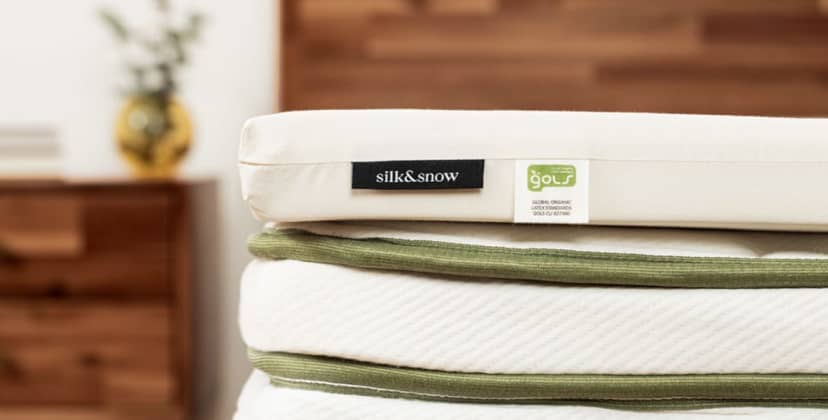
“Of all the toppers we’ve tested, the Silk & Snow Organic Mattress Topper offers some of the best cushioning without sacrificing support, and a breathable cotton cover helps enhance comfortable sleep.” – Logan Foley, Editorial Director
Price
$270
Material
100% GOLS-certified organic Dunlop latex
Firmness
Medium (5), Firm (7)
The Silk & Snow Organic Mattress Topper is made entirely from certified organic materials. With two firmness levels to choose from, many sleepers on our testing team were able to find a model that felt comfortable and supportive.
How It Performed
If you wish to improve the feel of a mattress with minor wear, the Silk & Snow’s 2-inch profile is an excellent choice. You can choose between a medium (5) and firm (7) feel. Our testing team found the medium model best suited for side sleepers over 230 pounds and back sleepers weighing up to 230 pounds. These groups experienced relief for pressure points without sinking excessively. The firm model offered an even sleep surface comfortable for back sleepers over 230 pounds and most stomach sleepers.
What It’s Made of
Silk & Snow’s Organic Mattress Topper features a Dunlop latex core. This material offers moderate cushioning without sinking too deeply beneath your weight, resulting in a comfortable balance of pressure relief and support. The topper’s components are also backed by Global Organic Textile Standard (GOTS) and Global Organic Latex Standard (GOLS) certifications. If you tend to sleep hot and you prioritize organic bedding, this topper checks off a lot of boxes.
An organic cotton cover encases the topper. Cotton is naturally breathable and moisture-wicking, so it’s great if you live in a warm or humid climate. For easy care, you can remove and machine wash the cover. Note that the latex core should only be spot cleaned.
The topper is available in all six standard mattress sizes. Silk & Snow offers free shipping to customers in the contiguous U.S. and provincial Canada, as well as a 100-night sleep trial. Organic Mattress Topper purchases include a 3-year warranty for the latex core and a 1-year warranty for the cotton cover.
Best for Spinal Alignment
PlushBeds Natural Latex Topper
Use this link for the most current PlushBeds discounts
Shop Now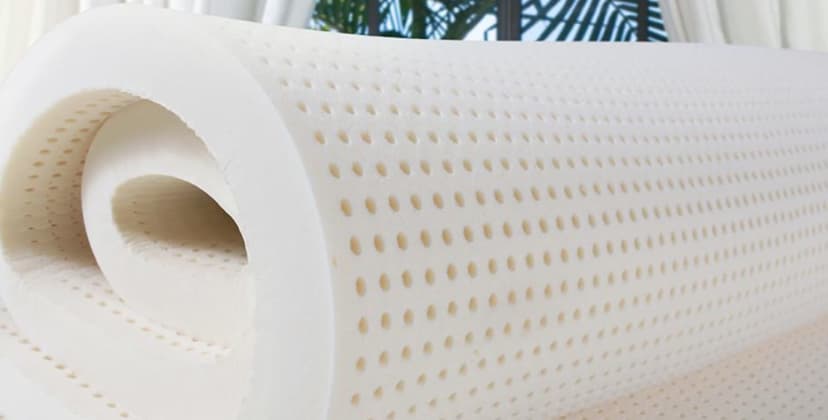
“The PlushBeds Natural Latex Topper epitomizes everything our team enjoys about latex sleep surfaces. Highlights during our tests include excellent airflow, good responsiveness to keep sleepers on an even plane, and easy movement when getting in and out of bed.” – Jackson Lindeke, Executive Director
-
Pros
-
Multiple thickness and firmness options
-
Breathable Talalay latex keeps the surface cool
-
Organic cotton cover available for an additional fee
-
-
Cons
-
Latex may not conform closely enough for sleepers who enjoy the “hug” of foam
-
Expensive pricing in most profiles/sizes and no returns accepted
-
Price
$429
Material
2-3″ natural Talalay latex
Firmness
Soft (3), Medium Soft (4), Medium (5), Medium Firm (6), Extra Firm (8)
PlushBed’s Latex Mattress Topper is available in two different profiles and five different firmness levels to suit most sleepers. Most of our testers across different weight groups, sleeping positions, and comfort preferences found a comfortable option that met their needs, but our side sleepers particularly enjoyed the cradling for their sore joints.
How It Performed
We found that testers up to 230 pounds tended to prefer the soft (3), medium (5), and medium firm (6) models. The firm (7) and extra firm (8) toppers suited those over 230 pounds. The thicker profile, which measures 3 inches, felt moderately more comfortable for side sleepers since it provided better pressure relief. If you own an older, indented mattress, you may also want this extra cushioning between your body and the mattress. The 2-inch option was best suited to testers who sleep on their back or stomach.
What It’s Made of
The topper is made of ventilated Talalay latex. The material did not contour as closely as memory foam, so it trapped far less heat. Talalay’s more responsive feel also provides pressure relief without excessive sinkage and restricts less movement across the surface, making the topper an excellent choice for sex and bed-sharing.
There’s an optional organic cotton cover you can add to your Latex Topper order for an additional fee. PlushBeds ships free to the contiguous U.S. The company does not allow returns for the topper, but all purchases come with a 5-year warranty.
Best Luxury
Birch Plush Organic Mattress Topper
Use this link for the most current Birch discounts
Shop Now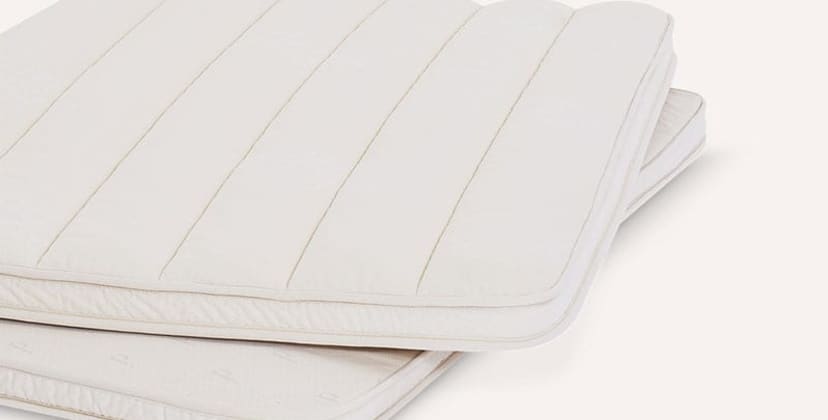
“The Birch Mattress Topper is made with high-end materials that excelled in our temperature control tests. We attribute its favorable ratings in this category to the breathable cotton cover, moisture-wicking wool batting, and latex fill that retains very little heat.” – Danny Noyed, Senior Product Editor
-
Pros
-
Natural, non-toxic materials
-
Breathable latex, organic cotton, and natural wool regulate temperature
-
Plush fill provides a soft, luxurious feel
-
-
Cons
-
Minimal contouring for people with pressure points
-
Sticker price is much higher than average
-
Price
$399
Material
Talalay Latex
Firmness
Medium (5)
Few toppers we’ve tested match the luxurious design of the Birch Mattress Topper. The premium latex and wool design earned high marks for its gentle pressure relief and overall comfort during tests. The topper also excelled at temperature control, thanks to the breathable cotton cover, moisture-wicking wool batting, and latex fill that retains very little heat.
How It Performed
The Talalay latex gently conforms to your body, but the topper has a medium (5) feel and its surface is somewhat responsive. This may be the right topper for you if you experience pressure points in sensitive areas like the shoulders, lower back, and hips, but don’t enjoy the deep sink of memory foam. During tests, we found that side sleepers who weigh at least 130 pounds felt fairly comfortable on this topper, and the same was true for back and stomach sleepers weighing up to 230 pounds.
The Birch Mattress Topper is a great option for hot sleepers, too. The latex does not trap much body heat compared to memory foam or polyfoam, and the breathable wool layer wicks moisture away from your body. Durability is another asset of this topper. Thanks to the natural resiliency of latex, the topper should maintain a responsive and supportive shape for years to come.
What It’s Made of
The Birch Mattress Topper is made from Talalay latex from sustainable rubber tree farms. The topper also contains a cover made of organic cotton and a top layer of natural wool, which regulates surface temperatures and acts as a fire barrier. These luxurious materials make the Birch Mattress Topper very eco-friendly, giving you extra peace of mind as a consumer.
The topper is a bit pricey, as is typical of models with natural latex layers. Birch offers a 100-night sleep trial, giving you plenty of time to test out the topper and decide whether or not it’s right for you. The topper also comes with a 10-year warranty.
“The Tempur-Pedic TEMPUR-Adapt Topper performed very well during our pressure relief and motion isolation tests. Thanks to its thick profile, the topper should improve the feel of most mattresses, which goes a long way toward alleviating sleep-related back pain.” – Logan Foley, Editorial Director
-
Pros
-
Thick profile and mid-range feel can significantly change how your sleep surface feels
-
Core material composed of durable TEMPUR memory foam
-
Cover is fully machine-washable
-
-
Cons
-
People over 230 pounds may sink too much
-
Expensive pricing and no sleep trial
-
Price
$419
Material
TEMPUR Memory Foam
Firmness
Medium (5)
If you live with chronic shoulder, back, or hip pain, you can benefit from a topper that softens your sleep surface and gently cushions your body. The Tempur-Pedic TEMPUR-Adapt Topper has the perfect amount of cushioning to ease pressure off your body while still offering enough support to maintain good sleep posture.
How It Performed
After testing the topper, we found it was best suited to people weighing up to 230 pounds. The foam provides ample padding for the shoulders and hips, which can improve alignment and alleviate pressure for side sleepers, but the foam is dense and supportive enough to prevent deep sinkage for back sleepers. If you awaken easily due to a sleep partner’s movements, you should be able to sleep soundly on the TEMPUR-Adapt Topper. The foam absorbs motion and practically eliminates transfer across the surface.
What It’s Made of
The topper measures 3 inches thick and consists of adaptive TEMPUR memory foam. The topper’s feel is medium (5), so you can expect the foam to closely contour to your body, but the material’s dense composition should also ensure long-lasting support and resistance to wear and tear. A breathable knit cover encases the foam. You may remove and machine wash the cover as needed, but only spot clean the foam if stains or blemishes occur. Six sizes are available, all of which correspond to standard mattress dimensions.
While the topper’s sticker price may seem steep at first glance, its expected durability and performance may justify the high cost. Tempur-Pedic also ships free of charge anywhere in the contiguous U.S. All sales are final, so the topper may not be returned for a refund after the purchase has been finalized, but you’ll receive a 10-year manufacturer’s warranty against structural and workmanship defects.
Best Firmness Options
Turmerry Latex Mattress Topper
Use this link for the most current Turmerry discounts
Shop Now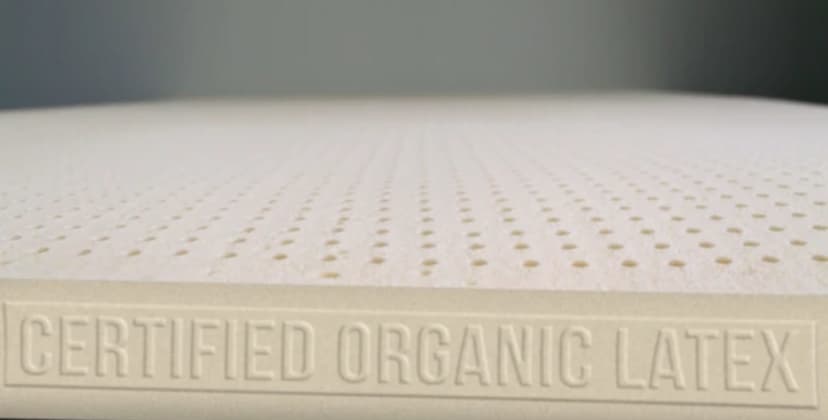
“I recommend the Turmerry Latex Mattress Topper for sleepers seeking a conforming yet responsive surface. The latex design gently cushions your body but is buoyant enough to prevent you from sinking right down to the mattress.” – Logan Foley, Editorial Director
-
Pros
-
Latex design offers balance of support and cushioning
-
Breathable Dunlop latex promotes cooling properties
-
Available in four firmnesses and three profile options
-
-
Cons
-
Latex produces some motion transfer
-
Not suitable for those with latex allergies
-
Price
$225
Material
2-4″ zoned Dunlop latex
Firmness
Soft (3), Medium (5), Medium Firm (6), Firm (7)
The Turmerry Latex Mattress Topper is responsive, breathable, and made with eco-friendly materials. Available in multiple firmness levels and profiles, this topper caters to a wide array of people with various preferences and sleep positions.
How It Performed
The topper is available in soft (3), medium (5), medium firm (6), and firm (7) designs. All options have a responsive feel and some degree of contouring. The surface, especially for the softer models, cradles sensitive joints without sacrificing too much support for the lower back. Latex is a naturally breathable material, especially compared to foams, so you should find relief with this topper if you tend to overheat during sleep. Couples may also appreciate the topper for its responsiveness during sex.
Side sleepers under 230 pounds gave especially high marks to the soft and medium toppers, since this position needs more contouring to ease pressure off the shoulders and hips. Back sleepers enjoyed the balance of cushioning and support in the three firmer models. Stomach sleepers and most people over 230 pounds favored the firmest option.
What It’s Made of
You can purchase a 2-inch, 3-inch, or 4-inch topper. The two thinner models are the same firmness on each side while the 4-inch model is flippable with soft (3) and medium (5) sides. Each version of the topper is composed of solid, ventilated Dunlop latex with certifications from the Global Organic Latex Standard (GOLS) and eco-INSTITUT. The 4-inch topper comes with a cover made of cotton with a Global Organic Textile Standard (GOTS) certification to ensure organic sourcing. For the 2- and 3-inch models, the cover is sold separately.
Turmerry offers free shipping within the contiguous U.S. Toppers come with a 5-year warranty and may be returned for a full refund within a 120-night trial period.
Best Mattress Toppers Video
Watch the video below to learn more about our lab’s best mattress toppers of 2024.
To learn more about our best mattress topper selections, you’ll find detailed product profiles below. We awarded a unique accolade to each topper that reflects why it stands out from the competition. First-time topper buyers can also find additional information further down the page, where we cover common topper materials and designs, pros and cons of different topper types, how using a topper will change your mattress, and how much you can expect to pay for a new one.
Why You Can Trust Us
Our team has personally evaluated dozens of mattress toppers to bring you the top picks listed in this guide. These models cover a wide spectrum in terms of material composition, firmness, and thickness, but each one is tested using the same comprehensive methodology to ensure our findings are accurate, useful, and free of bias. Our testing team includes side, back, stomach, and combination sleepers with differing body types. This diversity helps us make topper recommendations that are relevant for all sleepers.
How We Evaluated These Mattress Toppers
Testing toppers is much like testing mattresses. Our testers take turns sitting and lying down on each topper to evaluate qualities like motion isolation and ease of movement. We also use thermal imaging to measure heat retention and body-mapping sensors to monitor the buildup of pressure points. The best mattress toppers above stood out for various reasons, each one earning a spot on our top picks list. That said, we'll continue to evaluate mattress toppers in order to maintain an up-to-date list.
How We Test: Rigor, Data, and Sleeper Feedback
We understand every sleeper has their own unique set of needs and preferences. This is why we use an objective rating system that thoroughly analyzes different sleep products, allowing us to pinpoint specific pros and cons and make recommendations accordingly.
Our testing team is committed to helping you find the right sleep products and get the rest you need. In our Seattle-based Test Lab, we follow the same four-part process when evaluating each product. Guidelines for this system are listed below.
Construction analysis: We begin testing each topper by examining its design and making notes regarding thickness, firmness, and material composition. This cursory analysis helps us determine its durability, support, and overall quality.
Product testing: Hands-on testing is essential for our product ratings. We’ll take turns lying on each topper and shifting positions to evaluate contouring, pressure relief, motion isolation, and ease of movement.
Field testing: Our field testers use mattress toppers in their own home, collecting data over several weeks. This feedback gives us insights into each topper’s long-term performance and compatibility with different mattress types.
User testing: We collect data from surveys and product reviews to learn about feedback from mattress topper owners. This helps us verify our product ratings are accurate and indicative of real-world experiences.
In-Depth Mattress Topper Guides
For more personalized mattress topper guides, check out the following pages:
Mattress Topper Guides
- Best Feather Mattress Toppers
- Best Latex Mattress Toppers
- Best Memory Foam Mattress Toppers
- Best Soft Mattress Toppers
- Best Firm Mattress Toppers
- Best Mattress Toppers on Amazon
- Best Twin XL Mattress Toppers
- Best Queen Size Mattress Toppers
- Best King Size Mattress Toppers
- Best Organic Mattress Topper
Mattress Topper Reviews
- Layla Mattress Topper Review
- Dream Serenity Mattress Topper Review
- Saatva Mattress Topper Review
- Avocado Mattress Topper Review
- Casper Mattress Topper Review
- Molecule Mattress Topper Review
- Allswell Mattress Topper Review
- Novaform Mattress Topper Review
- Sleep is the Foundation Mattress Topper Review
- Sleepyhead Copper Mattress Topper Review
- Sleepyhead Gel Mattress Topper Review
How to Choose a Mattress Topper
Mattress toppers serve two essential functions: adjusting the feel of your mattress to make it softer or firmer, and protecting the surface from long-term wear and tear. In today’s mattress topper market, you can choose from a wide selection of models that vary by material, thickness, firmness, price-point, and overall performance. The best topper for you will depend entirely on your personal needs and preferences.
Below, we’ll take an in-depth look at the pros and cons of different mattress materials, explore the various benefits of using a topper, and answer a few frequently asked questions about these products.
What to Consider When Purchasing a Mattress Topper
Think of a new topper as an additional comfort layer for your mattress. You should judge different topper materials and models the same way you might evaluate a new mattress. Important factors include temperature control, conforming ability, durability, and motion isolation for couples. Pricing is another key variable, as well.
Keep in mind that some manufacturers use misleading marketing jargon to discuss how well their toppers perform. Watch out for descriptions such as “universal comfort” and “endless support,” as well as labels like “green” or “natural” for materials that are mostly composed of synthetic components. When shopping for a new topper, here are the most important points to consider:
- Cooling Properties: As is the case with mattresses, some mattress toppers bottle in body heat and sleep somewhat warm as a result. Memory foam, polyfoam, and non-ventilated latex tend to trap more heat than other topper materials, such as down and feathers or wool. Topper softness can also play a role in temperature regulation. If you sink too deeply into a topper, this can restrict surface airflow and make you feel too warm.
- Price: A new topper may cost less than $100 or more than $500, but most high-quality models sold today are priced between $150 and $450. Factors that can drive up a topper’s sticker price include its material composition, thickness, and whether or not the product has received certifications for organic or other materials. Additionally, some brands have steeper price-points than others.
- Sleeping Position: Do you sleep on your side? If so, chances are you’ll feel most comfortable on a topper that cushions the shoulders and hips to align the spine and reduce pressure points. Back sleepers generally need a firmer, more balanced feel. This ensures comfortable conforming and even support with minimal sagging around the torso and waist. For stomach sleepers, a topper should offer extra reinforcement between the shoulders and hips to prevent too much sinkage.
- Quality Materials: Certain topper materials are associated with longer lifespans and stronger performance in different categories. These include high-density memory foam, ventilated latex, natural wool, and premium down. While these materials can drive up the sticker price by a significant margin, the topper will offer better long-term value compared to a model made from lesser components.
- Firmness Level: Firmness level is strongly tied to sleep position and body type. People who weigh less than 130 pounds and/or sleep on their side will likely prefer a softer topper feel. Those who weigh between 130 and 230 pounds, regardless of sleep position, may be more satisfied with a mid-level firmness. People who weigh more than 230 pounds and sleep on their back and/or stomach should consider a firmer topper with stronger overall support.
- Thickness: The average topper measures between 1 and 3 inches thick. Since toppers are placed directly on the mattress surface, you’re essentially adding 1 to 3 inches to your bed’s overall profile. If you sleep on a bed that is already thick, then a high-profile topper may make the mattress feel too tall. This can make getting in and out of bed more difficult. Thin toppers, on the other hand, may not adjust the firmness of your mattress as well as thicker models can.
- Pressure Relief: The best mattress toppers for pressure relief will conform to the body and support the spine without sinking excessively. Side sleepers may need a softer feel. Otherwise, their spines will not be aligned and added pressure is likely to occur. Back and stomach positions promote spinal alignment, so these sleepers usually need more support and less conforming for optimal pressure relief.
How to Buy a Mattress Topper – Video
Watch the video below for some tips on how to shop for a mattress topper. We’ll explore some key questions and considerations that will help guide your search.
Which Type of Mattress Topper Should I Choose?
After reviewing the topper attributes listed above to determine which qualities are most important, you’ll be ready to choose a mattress topper based on its material composition. Every topper material carries different pros and cons related to pressure relief, durability, temperature neutrality, and other performance areas.
Memory Foam: Memory foam toppers are ideal if you like to sink into the surface of your bed. The material conforms closely to evenly distribute your weight and keep your shoulders, spine, and hips aligned. For this reason, many side sleepers prefer memory foam toppers. Memory foam also isolates motion transfer very well and does not produce any noise, making it a great option for couples and co-sleepers. Although memory foam can trap heat, toppers can be infused with gel, graphite, copper, and other cooling materials to help the surface maintain a comfortable temperature.
Polyfoam: Polyfoam conforms to the body, but not quite as closely as memory foam. This material also feels a bit more responsive. You may find a polyfoam topper comfortable if you want a balance of contouring and surface-level bounciness. Many polyfoam toppers are convoluted with a ridged surface; these models are also known as “egg-crate toppers.”
Latex: Like polyfoam, latex conforms to the body while maintaining a responsive feel. You’ll probably feel less pressure, but your body won’t sink too deeply. Back and stomach sleepers who need more support may find a latex topper more comfortable than a memory foam model. When ventilated with small holes to promote airflow, latex also sleeps very cool compared to foam.
Other Materials: Memory foam, polyfoam, and latex toppers are most common, but these are not your only options. A topper made from down and feathers, for example, might be your best choice if you prefer an ultra-plush surface that is also highly breathable. Wool toppers can be advantageous because they provide insulation during colder times of the year, but also provide cooling and moisture-wicking when the temperatures rise. Lastly, many toppers padded with polyester fibers offer adequate cushioning at a very affordable price-point.
It’s also important to distinguish between toppers and Euro-top or pillow-top covers. A pillow-top is a layer of padding sewn into the sleep surface of a mattress, leaving a small gap separating it from the bed’s comfort layer. A Euro-top is also sewn into the mattress surface, but its edges are flush with the comfort layer to create a more uniform appearance.
Pillow-tops and Euro-tops offer the same cushioning and comfort adjustment as a standard mattress topper, but these layers are typically offered as customization options for a new mattress, rather than an additional layer sold separately; otherwise you’d be responsible for sewing the pillow-top or Euro-top onto your mattress.
What Are the Benefits of a Mattress Topper?
Advantages of using a mattress topper include the following:
Firmness Adjustment
A topper can significantly change the surface feel of your mattress. Most toppers offer a softer feel and are designed to be used with a firm mattress, but some models are intended to make a soft mattress feel firmer. If you’re dissatisfied with your mattress firmness but don’t want to pay for a new bed, a topper can be a cost-effective solution. Thick toppers will adjust your firmness more significantly than thin toppers, so you should keep thickness in mind if you’re hoping to make your bed feel firmer or softer.
Mattress Protection
Toppers are different from mattress protectors, which are very thin and solely designed to safeguard your mattress against spills, stains, dust, and other contaminants. However, toppers can help preserve your bed’s surface and prevent the comfort layer material from wearing out. This can extend the overall lifespan of your mattress.
Stronger Support
Over time, the comfort layer of your mattress will deteriorate. This can cause a loss of support that makes the surface feel uneven, and added aches and pains often follow. A sturdy topper adds an extra layer to keep your body on an even plane and prevent it from sagging in areas where you carry a lot of weight.
Better Cooling
If the surface of your mattress tends to trap heat and sleep warm, then a breathable topper can provide better temperature regulation to help you sleep more comfortably. The best cooling mattress topper materials include ventilated latex, natural wool, and open-cell foam.
Fewer Disruptions
Does the surface of your mattress respond quickly to movement when you or your sleep partner move around? If so, both of you may experience sleep disruptions related to poor motion isolation; this issue is particularly common with hybrid and innerspring mattresses. A topper made from memory foam, polyfoam, or latex will absorb more movement and prevent most of this motion from transferring across the surface.
Cost-Effective Solution
While prices vary, most mattress toppers cost much less than a new mattress in the same size. Toppers should be seen as a short-term solution because they are not as durable as mattresses, but using a topper instead of buying a new bed can save you hundreds, if not thousands, of dollars.
Mattress Topper FAQ
A mattress topper is a layer of cushioning material that rests on the top surface of your mattress, usually tucked beneath a fitted sheet. Unlike pillow-tops or Euro-tops, toppers are not attached to the mattress and can be removed at any time.
The purpose of a topper is to improve how your mattress feels. As cushioning materials deteriorate and soften over time, the surface of a mattress will become uneven from body impressions and indentations. This can decrease support and lead to aches and pains. Most toppers have soft to medium feels, and are intended to add cushioning to a firm mattress. However, some toppers are on the firmer side and meant for mattresses that feel overly soft.
Common fill materials for toppers include memory foam, polyfoam, latex, down and feathers, down alternative fibers, and wool. Most toppers measure 1.5 to 4 inches thick.
The terms “mattress pad” and “mattress topper” are often used interchangeably, but this is technically incorrect. Pads are thinner than toppers and designed to provide minor comfort adjustments. Some pads are also waterproof and can protect the mattress from liquid damage. Toppers provide a significant comfort adjustment, and are almost never waterproof.
Many foam and latex toppers come with removable, machine-washable covers. Be sure to follow specific instructions listed on the cover’s care tag. The foam or latex core should only be spot-cleaned when necessary, as machine-washing can permanently damage these materials.
If the cover is not removable, dry cleaning will probably be the safest method of caring for your topper. Some toppers with down alternative or wool fill are technically machine-washable, but significant shrinkage and material deterioration can occur over time. Toppers with larger sizes may also be too big for household washing machines.
A mattress topper’s cost depends on many factors. These include the fill and cover material, size, thickness, and brand. In general, expect to pay between $150 and $400 for a queen size topper. Memory foam, wool, and latex models tend to cost the most, while convoluted polyfoam – or “egg crate” – toppers are often the most affordable options.
Average price breakdowns for different topper types are listed below:
Convoluted/Egg Crate Polyfoam: Less than $50
Fiber Fill: Less than $100
Down/Feather: $100 to $200
Memory Foam: $150 to $300
Wool: $150 to $300
Latex: $200 to $400
Unfortunately, sliding is an issue for many topper owners. Some toppers are equipped with elastic loops to fit around the corners of your mattress, or “anti-slip” bottoms that provide traction and prevent excessive shifting. If a topper does not include these features, it may slide across your mattress during the night – especially if it’s on the lighter side.
Tucking the topper beneath a fitted sheet can mitigate this issue, as can covering the topper with a flat sheet and tucking its edges beneath your mattress. Also make sure the topper and mattress share the same size.
If you’ve owned your mattress for a few years and already notice unevenness in the surface, a topper can help you squeeze a few more years out of the mattress before you purchase a new one. However, this should be considered a temporary fix. The topper – like your mattress – will develop impressions and indentations with continuous use.
Toppers can also be great additions for guest rooms, especially if your overnight visitors sleep on foldout couches, futons, and other surfaces that people tend to find uncomfortable. The same is true if you have guests who sleep on the floor. Guest room toppers typically last longer because they are used less frequently.

Still have questions?
Our product experts have extensive experience testing just about every sleep product on the market.
Send an email to [email protected] with your questions and we’ll help you find exactly what you’re looking for.

